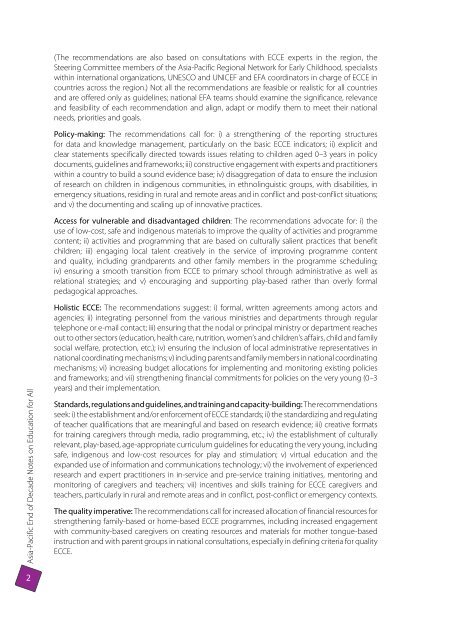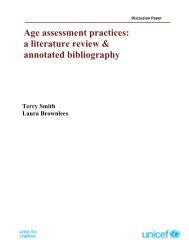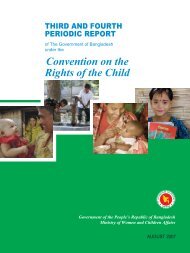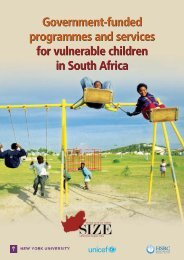EFA Goal 1: Early childhood care and education; Asia ... - Unicef
EFA Goal 1: Early childhood care and education; Asia ... - Unicef
EFA Goal 1: Early childhood care and education; Asia ... - Unicef
You also want an ePaper? Increase the reach of your titles
YUMPU automatically turns print PDFs into web optimized ePapers that Google loves.
(The recommendations are also based on consultations with ECCE experts in the region, the<br />
Steering Committee members of the <strong>Asia</strong>-Pacific Regional Network for <strong>Early</strong> Childhood, specialists<br />
within international organizations, UNESCO <strong>and</strong> UNICEF <strong>and</strong> <strong>EFA</strong> coordinators in charge of ECCE in<br />
countries across the region.) Not all the recommendations are feasible or realistic for all countries<br />
<strong>and</strong> are offered only as guidelines; national <strong>EFA</strong> teams should examine the significance, relevance<br />
<strong>and</strong> feasibility of each recommendation <strong>and</strong> align, adapt or modify them to meet their national<br />
needs, priorities <strong>and</strong> goals.<br />
Policy-making: The recommendations call for: i) a strengthening of the reporting structures<br />
for data <strong>and</strong> knowledge management, particularly on the basic ECCE indicators; ii) explicit <strong>and</strong><br />
clear statements specifically directed towards issues relating to children aged 0–3 years in policy<br />
documents, guidelines <strong>and</strong> frameworks; iii) constructive engagement with experts <strong>and</strong> practitioners<br />
within a country to build a sound evidence base; iv) disaggregation of data to ensure the inclusion<br />
of research on children in indigenous communities, in ethnolinguistic groups, with disabilities, in<br />
emergency situations, residing in rural <strong>and</strong> remote areas <strong>and</strong> in conflict <strong>and</strong> post-conflict situations;<br />
<strong>and</strong> v) the documenting <strong>and</strong> scaling up of innovative practices.<br />
Access for vulnerable <strong>and</strong> disadvantaged children: The recommendations advocate for: i) the<br />
use of low-cost, safe <strong>and</strong> indigenous materials to improve the quality of activities <strong>and</strong> programme<br />
content; ii) activities <strong>and</strong> programming that are based on culturally salient practices that benefit<br />
children; iii) engaging local talent creatively in the service of improving programme content<br />
<strong>and</strong> quality, including gr<strong>and</strong>parents <strong>and</strong> other family members in the programme scheduling;<br />
iv) ensuring a smooth transition from ECCE to primary school through administrative as well as<br />
relational strategies; <strong>and</strong> v) encouraging <strong>and</strong> supporting play-based rather than overly formal<br />
pedagogical approaches.<br />
<strong>Asia</strong>-Pacific End of Decade Notes on Education for All<br />
Holistic ECCE: The recommendations suggest: i) formal, written agreements among actors <strong>and</strong><br />
agencies; ii) integrating personnel from the various ministries <strong>and</strong> departments through regular<br />
telephone or e-mail contact; iii) ensuring that the nodal or principal ministry or department reaches<br />
out to other sectors (<strong>education</strong>, health <strong>care</strong>, nutrition, women’s <strong>and</strong> children’s affairs, child <strong>and</strong> family<br />
social welfare, protection, etc.); iv) ensuring the inclusion of local administrative representatives in<br />
national coordinating mechanisms; v) including parents <strong>and</strong> family members in national coordinating<br />
mechanisms; vi) increasing budget allocations for implementing <strong>and</strong> monitoring existing policies<br />
<strong>and</strong> frameworks; <strong>and</strong> vii) strengthening financial commitments for policies on the very young (0–3<br />
years) <strong>and</strong> their implementation.<br />
St<strong>and</strong>ards, regulations <strong>and</strong> guidelines, <strong>and</strong> training <strong>and</strong> capacity-building: The recommendations<br />
seek: i) the establishment <strong>and</strong>/or enforcement of ECCE st<strong>and</strong>ards; ii) the st<strong>and</strong>ardizing <strong>and</strong> regulating<br />
of teacher qualifications that are meaningful <strong>and</strong> based on research evidence; iii) creative formats<br />
for training <strong>care</strong>givers through media, radio programming, etc.; iv) the establishment of culturally<br />
relevant, play-based, age-appropriate curriculum guidelines for educating the very young, including<br />
safe, indigenous <strong>and</strong> low-cost resources for play <strong>and</strong> stimulation; v) virtual <strong>education</strong> <strong>and</strong> the<br />
exp<strong>and</strong>ed use of information <strong>and</strong> communications technology; vi) the involvement of experienced<br />
research <strong>and</strong> expert practitioners in in-service <strong>and</strong> pre-service training initiatives, mentoring <strong>and</strong><br />
monitoring of <strong>care</strong>givers <strong>and</strong> teachers; vii) incentives <strong>and</strong> skills training for ECCE <strong>care</strong>givers <strong>and</strong><br />
teachers, particularly in rural <strong>and</strong> remote areas <strong>and</strong> in conflict, post-conflict or emergency contexts.<br />
The quality imperative: The recommendations call for increased allocation of financial resources for<br />
strengthening family-based or home-based ECCE programmes, including increased engagement<br />
with community-based <strong>care</strong>givers on creating resources <strong>and</strong> materials for mother tongue-based<br />
instruction <strong>and</strong> with parent groups in national consultations, especially in defining criteria for quality<br />
ECCE.<br />
2

















